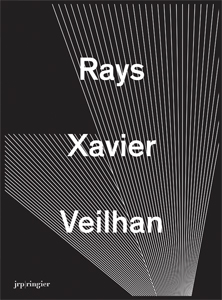Artist's book.
Since the mid-1990s, French artist Xavier Veilhan
has created an acclaimed body of works defined by his interest both in
the vocabulary of modernity (speed, motion, urban life, etc.) and in
classical statuary—to which he has given his own contemporary
reinterpretation. He uses a large array of materials and techniques to
produce three-dimensional portraits and landscapes, bestiary and
architectures that always oscillate between the familiar and the
extraordinary.
Since 2011, he has been working on “Rays,” an on-going series of
works formulated as a tribute to Jesús Rafael Soto and Fred Sandback.
Dealing with the possibilities of representation and the question of
display—two important issues in his practice—these works are
immersive and optical environments that play with scale, light, shadows,
and ephemeral architecture. They have been presented in numerous
institutions and public spaces, including
Le Corbusier's “Cité Radieuse”
in Marseille, Sheats Goldstein Residence in Los Angeles, Hatfield House
(UK), and La Conservera in Murcia.
Along with extensive photographic documentation of the successive
“Rays” installations, this artist's book also presents preliminary
sketches and Veilhan's iconographic research into scientific imagery,
architectural references, and artistic figures. Excerpts from
19th-century literature gives another glimpse into Veilhan's inspiration
for “Rays.”
Through his portraits and landscapes, his bestiary and his architectures, Xavier Veilhan (born 1963 in Lyon, lives and works in Paris) pursues a constantly regenerated reflection on the status of representation and the materialization of an idea, using the same space for sculpture, painting and photography. A manufacturer of the visible, he invents works, images, and objects that hesitate between the familiar and the strange. Interested in modernity and using references ranging from classical statuary to Futurism and Op art, Veilhan has been compared to artists such as Damien Hirst and Jeff Koons. For Jean-Pierre Criqui he is "a perfect example of a Pop artist for the 21st century, with an accessible formal vocabulary and referents, while at the same time cultivating a certain air of detachment and reserve in his use of affects, thereby distancing himself from the empathy aroused by direct borrowings from the sphere of commodities and the media."






